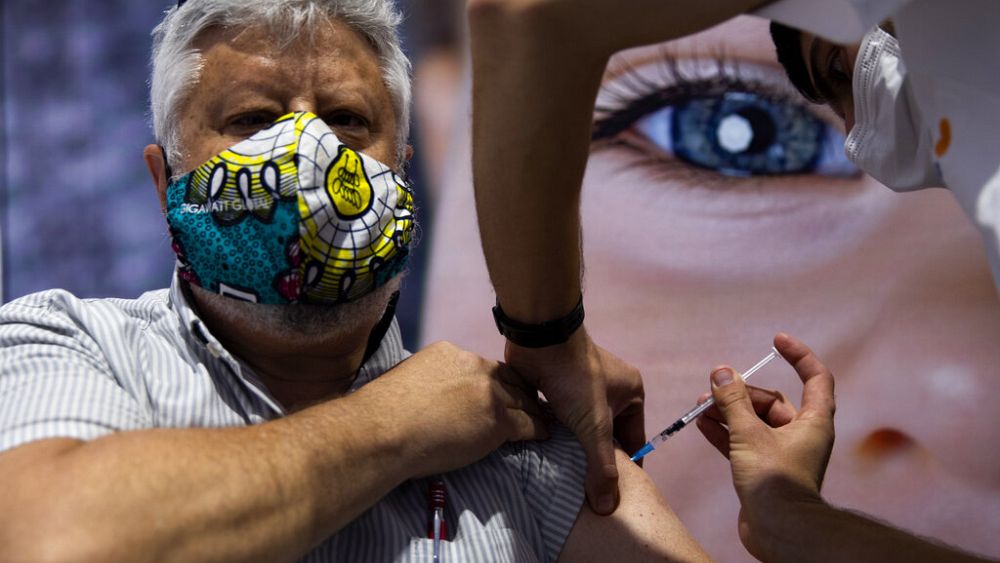
The European Medicines Agency has issued guidelines for coronavirus vaccine manufacturers who plan to adapt already permitted shots to new variants.
The EU regulator says the three approved vaccines, made by Pfizer, Moderna and AstraZeneca, “provide protection against the variants currently found across Europe”.
“However, it appears that with persistent mutations and new variants emerging, approved vaccines may need to be adapted in time to ensure continued protection.”
The variant that is of greatest concern at the moment is one that first showed up in South Africa because of the evidence that it can reduce the effectiveness of the vaccines. The so-called British and Brazilian variants are also spreading quickly.
EMA says its experts assumed the modified vaccine would work in the same way as the original injection, except it changes the part that triggers the body’s immune response.
It says that ‘large scale safety and efficacy studies are not needed’, but at least one clinical trial is recommended in people who have not been vaccinated or infected with the coronavirus.
The agency also suggested a study with a small group randomly selected to receive either the parent vaccine or the variant vaccine to ensure that they both elicit similar immune responses.
It says there should be research into the use of tweaked vaccines as a booster shot to protect against variants, and it expects manufacturers to provide data on the manufacturing quality of the modified vaccines.
Pfizer is studying 3rd vaccination shot
The new guidelines come as Pfizer began to investigate whether a third dose of its COVID-19 vaccine could protect against mutated versions of the virus, the company said Thursday.
The pharmaceutical giant said it will offer a third dose to 144 volunteers among participants in the early testing of the vaccine in the United States last year.
It wants to determine whether an extra booster shot, given six to 12 months after the first two doses, would activate the immune system enough to ward off a mutated virus.
“While we have not seen any evidence that the circulating variants result in a loss of protection from our vaccine, we are taking several steps to act decisively and be ready in case a strain becomes resistant to the protection provided by the vaccine” Pfizer’s CEO Albert Bourla said in a press release.
“This booster study is critical to understand the safety of a third dose and immunity to circulating stresses,” he added.
Pharmaceutical giants are working on updated recipes
In parallel, Pfizer and its German partner, BioNTech, are also changing their vaccine recipe.
The companies said they were in talks with US and EU regulators about a “study to evaluate a variant-specific vaccine with a modified mRNA sequence. This study would use a new construct of the Pfizer-BioNTech vaccine based on the B.1.351 line, first identified in South Africa. “
Pfizer’s competitor Moderna announced on Wednesday that it is ready to test experimental doses of its vaccine that are better suited to the South African variant of the virus.
Pfizer and Moderna coronavirus vaccines use a so-called mRNA technology that is easy to update. Their vaccines use a piece of genetic code for the spike protein that envelops the virus so the immune system can learn to recognize and fight the real thing.
If a variant with a mutated spike protein emerged that the original vaccine can’t recognize, companies would trade that piece of genetic code for a better match – if and when regulators decide it’s necessary.
But tweaking other coronavirus vaccines can be more complex. For example, the AstraZeneca shot uses a harmless version of a cold virus to deliver that spike protein gene into the body. An update requires growing cold viruses with the updated spike gene.
The US regulator said studies on updated COVID-19 vaccines need not be as large or lengthy as for first-generation injections. Instead, a few hundred volunteers could be given experimental doses of a modified vaccine to see if their immune system responds to the updated shot in the same way as to the original.